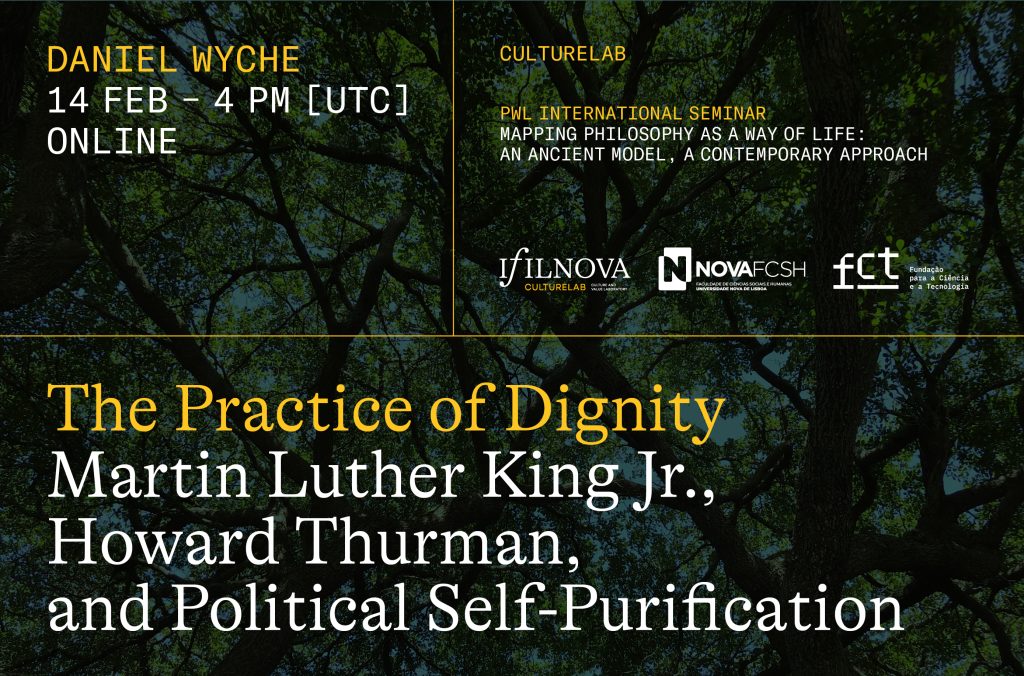DANIEL WYCHE
“The Practice of Dignity: Martin Luther King Jr., Howard Thurman, and Political Self-Purification”
February, 14 | 16h00 (UTC)
11h00 New York | 13h00 Brasília | 16h00 Lisbon | 17h00 Berlin | Other locations

Abstract
“Anyone who permits another to determine the quality of his inner life gives into the hands of the other the keys to his destiny. If a man knows precisely what he can do to you or what epithet he can hurl against you in order to make you lose your temper, your equilibrium, then he can always keep you under subjection. It is a man’s reaction to things that determines their ability to exercise power over him.”
—Howard Thurman, Jesus and the Disinherited (1949)
In this 1963 landmark “Letter from Birmingham Jail,” the American organizer, philosopher, political theorist, and theologian Martin Luther King Jr. famously if enigmatically invokes a notion of political “self-purification” as a necessary condition for ethical and efficacious direct action. This concept raises many immediate questions: what is the “self” which must be purified? What must it be purified of? How, by which practices and through what methods does such a transformation take place? How does the transformation of an individual self intersect with the collective nature of political organizing? How, finally, do figures like King articulate a politics of self-transformation that does not simply reduce the transformation of material, economic, and institutional conditions to the mere ethical transformation of individual subjects? Drawing on the third chapter of my book The Care of the Self and the Care of the Other (forthcoming from Columbia University Press), this talk will elaborate the systematic conceptual apparatus behind King’s invocation of political self-purification in Birmingham. This concept has a long history in the tradition of Gandhian non-violence within which King sits squarely, if not exhaustively. It is very directly informed by a dynamic conception of the subject and power articulated by King’s mentor, the polymath Howard Thurman (1899-1981). Born of Thurman’s unique ability to marry insights wrought from a life subject to forms of racist dehumanization with theoretical resources garnered from the history of philosophy and theology, I show how his description and theorization of subjection provide a ground for his historic understanding of the relationship of the ethical transformation of the self to the political transformation of the world. Against this background and with Thurman’s help, I conclude by showing some of the ways that King’s idea of political self-purification deftly and efficaciously weds critical intellectual praxis with concrete political action.
Bio
Daniel Louis Wyche received his PhD from the University of Chicago Divinity School in 2020. His reasearch focuses on the political content and consequences of philosophical notions of “spiritual exericses,” “the care of the self,” philosophy as a form of life, or what may be generally called ethical practices of self-change. His first book, The Care of the Self and the Care of the Other (forthcoming from Columbia University Press) investigates the question of how, from what perspective, and under what conditions, might forms of the care of the self be coterminus in practice with the care of the other, the care of the community, and the care of the city. Alongside Niki Kasumi Clements, Daniel is co-organizer of the Foucault and the Study of Religion seminar at the American Academy of Religion. Daniel has also been active as a musician, curator, and programmer with a number of organizations within the world of experimental and improvised music and related arts for over a decade, and is especially interested in the relationship between improvisation and forms of philosophical life.
Registration required via email to mapping.pwl@gmail.com
